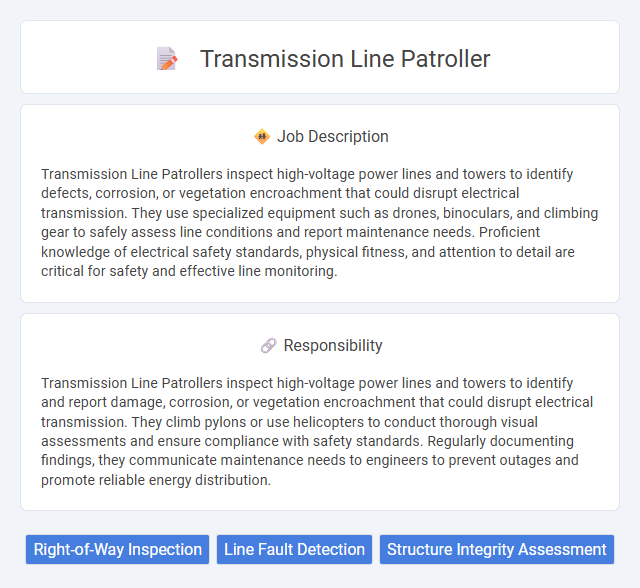
Transmission Line Patrollers inspect high-voltage power lines and towers to identify defects, corrosion, or vegetation encroachment that could disrupt electrical transmission. They use specialized equipment such as drones, binoculars, and climbing gear to safely assess line conditions and report maintenance needs. Proficient knowledge of electrical safety standards, physical fitness, and attention to detail are critical for safety and effective line monitoring.
Individuals with strong physical stamina and good eyesight are more likely to excel as Transmission Line Patrollers due to the demanding nature of inspecting power lines in various weather conditions. Those who have a high tolerance for heights and are comfortable working in remote or rugged environments may find this job suitable. Candidates lacking these physical and mental traits might struggle to perform effectively or safely in this role.
Qualification
Transmission Line Patrollers typically require a high school diploma or equivalent, complemented by specialized training in electrical systems and safety protocols. Candidates must possess physical fitness, the ability to work at heights, and certification in first aid and CPR. Experience with climbing, electrical maintenance, and knowledge of OSHA regulations enhances job qualification and performance.
Responsibility
Transmission Line Patrollers inspect high-voltage power lines and towers to identify and report damage, corrosion, or vegetation encroachment that could disrupt electrical transmission. They climb pylons or use helicopters to conduct thorough visual assessments and ensure compliance with safety standards. Regularly documenting findings, they communicate maintenance needs to engineers to prevent outages and promote reliable energy distribution.
Benefit
Working as a Transmission Line Patroller offers the probability of competitive compensation and comprehensive benefits packages, including health insurance and retirement plans. Safety training and career advancement opportunities may enhance job security and skill development. Consistent fieldwork could also provide physical activity and varied work environments that some find rewarding.
Challenge
The Transmission Line Patroller position likely involves navigating difficult terrains and extreme weather conditions, demanding physical endurance and keen attention to safety protocols. There is a strong probability that the role requires identifying potential faults or hazards proactively to prevent outages or accidents. Frequent exposure to high voltages and remote locations may pose significant challenges, emphasizing the need for thorough training and situational awareness.
Career Advancement
Transmission Line Patrollers monitor and inspect electrical power lines to ensure safety and functionality, using advanced climbing and monitoring equipment. Career advancement opportunities include progressing to roles such as Line Foreman, Safety Supervisor, or Transmission Technician, often requiring additional certifications and leadership skills. Developing expertise in power system operations and safety regulations significantly enhances prospects for promotion and higher salary brackets.
Key Terms
Right-of-Way Inspection
Transmission Line Patrollers conduct thorough Right-of-Way (ROW) inspections to ensure clear corridors along high-voltage power lines, preventing vegetation encroachment that could cause outages or safety hazards. They identify structural damages, erosion, and unauthorized access within the ROW, facilitating timely maintenance and vegetation management. These inspections support grid reliability by mitigating risks and ensuring compliance with safety and environmental regulations.
Line Fault Detection
Transmission Line Patrollers specialize in detecting and diagnosing line faults to ensure reliable power delivery. They employ advanced technologies such as infrared thermography, drones, and partial discharge sensors for precise fault identification on high-voltage lines. Rapid fault detection and repair minimize downtime and prevent large-scale power outages, enhancing grid stability and safety.
Structure Integrity Assessment
Transmission Line Patrollers conduct detailed inspections of power line structures to ensure structural integrity and prevent outages. Using advanced tools and visual assessments, they identify corrosion, cracks, and hardware defects that could compromise safety and reliability. Regular integrity assessments help maintain optimal performance and extend the lifespan of transmission infrastructure.
 kuljobs.com
kuljobs.com